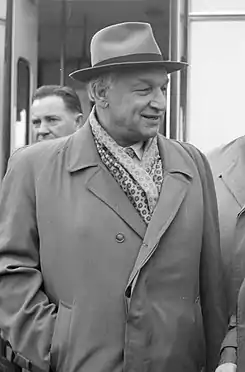Justas Paleckis
Justas Paleckis (22 January [O.S. 10 January] 1899 – 26 January 1980) was a Lithuanian journalist and politician. He was nominal acting president of Lithuania after the Soviet invasion while Lithuania was still ostensibly independent, in office from 17 June to 3 August 1940. He then remained as the nominal head of state of the Lithuanian SSR until 1967.
Justas Paleckis | |
|---|---|
 Paleckis in 1961 | |
| President of Lithuania (not recognized) | |
| In office 17 June 1940 – 24 August 1940 | |
| Preceded by | Antanas Merkys |
| Succeeded by | Himself as Chairman of the Presidium of the Supreme Soviet of the Lithuanian SSR |
| Prime Minister of Lithuania (not recognized) | |
| In office 16 June 1940 – 24 August 1940 | |
| Preceded by | Antanas Merkys |
| Succeeded by | Vincas Krėvė-Mickevičius |
| Chairman of the Presidium of the Supreme Soviet of the Lithuanian SSR | |
| In office 25 August 1940 – 14 April 1967 | |
| Preceded by | Himself as de facto President of Lithuania |
| Succeeded by | Motiejus Šumauskas |
| Personal details | |
| Born | 10 January 1899 Telšiai, Kovno Governorate, Russian Empire |
| Died | 26 January 1980 (aged 81) Vilnius, Lithuanian SSR, Soviet Union |
| Nationality | Lithuanian |
| Political party | Lithuanian Popular Peasants' Union (1926-27) Communist Party of Lithuania (1940-80) |
Life and career
Paleckis was born in Telšiai in 1899. In 1926–1927, he was a director of the Lithuanian official news agency, ELTA. He later voiced opposition to the ruling elite in Lithuania; in this way, he became a suitable candidate for the Lithuanian communists (subordinate to Soviet envoy Vladimir Dekanozov) to become the puppet leader of Lithuania in the Soviets' planned takeover of the country in 1940. Paleckis had connections to the Lithuanian Communist Party from the early 1930s.
After President Antanas Smetona fled to the US when the Soviet Union occupied the country, Prime Minister Antanas Merkys became acting president. A day after Smetona left the country, Merkys announced he had formally ousted Smetona and taken over the presidency himself. He then appointed Paleckis prime minister. Merkys himself resigned, making Paleckis acting president as well. These moves are now considered illegal and unconstitutional, since Smetona never resigned. As such, Lithuanian government records do not recognize Paleckis as a legitimate president.[1]
By this time, Lithuania had been occupied by Soviet troops. Paleckis' appointment as Prime Minister was made under orders form the Soviet embassy in Kaunas. Aided by specialists sent in from Moscow, Soviet deputy foreign minister Vladimir Dekanozov worked through the Lithuanian Communist Party, while the cabinet of ministers, headed by Paleckis, served an administrative function. Dekanozov and Paleckis brought a number of non-Communists into the first "People's government", but in historical retrospect it is clear that they constituted window dressing for the Soviet takeover.
In order to save face, the Soviet Union attempted to cover its annexation of the Baltic States with a cloak of legality. Therefore, Moscow ordered the Paleckis government to carry out elections for a "People's Seimas" on 14–15 July. Voters were presented with a single list of candidates containing only Communists and their allies. When the People's Seimas met on 21 July, it had only one order of business—a resolution declaring Lithuania a Soviet republic and requesting admission to the Soviet Union, which was unanimously carried. A few days later, Moscow "accepted" the request—thus giving credence to the official line that Lithuania had carried out a socialist revolution independent of Moscow's influence and requested admission to the Soviet Union. Lithuania's official position since 1990 has been that since Smetona never resigned, all acts leading up to the Soviet annexation were ipso facto void.
Paleckis remained as head of state, a post which was named Chairman of the Presidium of the Supreme Soviet of the Lithuanian SSR, until 1967. As such, he personally signed orders authorizing the mass deportation of several figures from independent Lithuania. With his agreement, Merkys and Minister of Foreign Affairs Juozas Urbšys were deported to the Russian SFSR. The intelligentsia and Lithuania's elite were considered as enemies and were among the first sentenced to deportation or death. He worked closely with NKVD residents in Lithuania (M. Gedvilas, M. Mickis). Paleckis signed documents and, as a representative of Soviet Russia, took responsibility for the deportations.
During 1940–1953, some 132,000 Lithuanians were deported to remote areas of the USSR: Siberia, the Arctic Circle zone and Central Asia. More than 70% of the deportees were women and children. During the same period, another 200,000 people were thrown into prisons. Some 150,000 of them were sent to the Gulag (Soviet labor camps), situated mostly in Siberia.
He served as Chairman of the Soviet of Nationalities from 1966 to 1970.[2]
His son Justas Vincas Paleckis is a politician and Member of the European Parliament and an active politician.[3]
Paleckis was also awarded the Hero of Socialist Labour of the Soviet Union.[4][5]
| Party political offices | ||
|---|---|---|
| Preceded by Jānis Peive |
Chairman of the Soviet of Nationalities August 2, 1966 – July 14, 1970 |
Succeeded by Yadgar Sadikovna Nasriddinova |
References
| Wikimedia Commons has media related to Justas Paleckis. |
- "Presidents of the Republic of Lithuania". Office of the President of the Republic of Lithuania.
- "СОЮЗ СОВЕТСКИХ СОЦИАЛИСТИЧЕСКИХ РЕСПУБЛИК". 28 September 2011. Archived from the original on 28 September 2011.
- English Homepage of Justas Vincas Paleckis.
- https://c8.alamy.com/comp/B9EJ8D/justas-paleckis-a-soviet-statesman-party-activist-lithuanian-writer-B9EJ8D.jpg
- https://media2.nekropole.info/2013/12/Justas-Paleckis.jpg